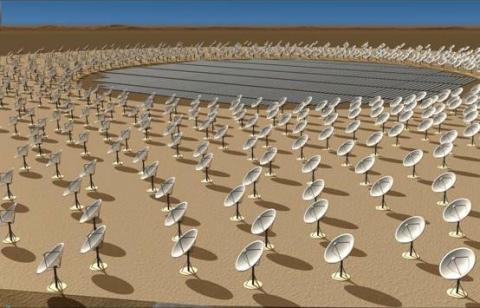Context
Recently, India has joined the Square Kilometer Array (SKA) project, an international scientific collaboration working to build the world’s largest radio telescope.
About
- India has been contributing to the project for several years, but the full member status requires countries to sign and ratify an international treaty, and also make a financial commitment.
- India has approved Rs 1,250 crore for the project, which includes its funding contribution for the construction phase.
- The decision to join SKA as a full member ensures India’s participation in yet another international mega science project in the most advanced areas of scientific research.
- India has also decided to build a gravitational wave detector to join the international LIGO (Laser Interferometer Gravitational Wave Observatory) network.
Laser Interferometer Gravitational-Wave Observatory
- LIGO was designed to open the field of gravitational-wave astrophysics through the direct detection of gravitational waves predicted by Einstein’s General Theory of Relativity.
- LIGO made its first detection of gravitational waves, generated by a pair of colliding black holes some 1.3 billion light years away.
Square Kilometer Array (SKA)
- It is a collection of thousands of dish antennas operating as a single unit, and not a single large telescope.
- Its name comes from the original intention to create one square kilometer (one million square meter) of effective area for collecting radio waves.
- It achieved by installing thousands of smaller antennas in a specific array design that would make them function like a single radio telescope.
Status of SKA
- The antennas are being installed in sparsely populated locations, about 200 of them in South Africa and more than 130,000 in Australia, chosen to ensure they are as far away from human activities as possible.
- Construction at both the sites began in December 2022, and the first phase of the project is expected to be completed by next year.
- Once operational, SKA would be between 5 to 60 times more powerful than the most advanced existing radio telescopes functioning in comparable frequency ranges.
India’s Status
Long-Standing Involvement:
- India has been part of the SKA project since its inception in the 1990s.
- Contribution extends to design, development, and negotiating the SKA Observatory Convention.
Telescope Manager Development:
- Key contribution in developing and operating the Telescope Manager.
- This software, often termed a ‘neural network,’ is crucial for running the entire SKA facility.
Plans for Regional Centre:
- There are plans to establish an SKA regional centre in India.
- This center will be integrated into the global network for processing, storing, and sharing data with the scientific community.
Research Areas Identified:
- Indian scientists have pinpointed specific research areas for SKA telescope use.
- These areas include the evolution of the early universe, formation and evolution of galaxies, neutron star physics, and solar sciences.
Active Participation:
- Over 150 scientists, researchers, and students from 30+ Indian institutions, including private companies, are actively involved.
India’s benefits from joining SKA:
- Next-level radio astronomy: Access to the world’s most powerful tool for studying pressing astronomical questions, building on India’s existing expertise Giant Meter wave Radio Telescope (GMRT).
- Preferential access: Guaranteed research time on SKA, unlike the competitive bidding system for non-member countries.
- Cutting-edge technology: Learning opportunities in electronics, software, materials science, and computing from SKA’s advanced technology.
- Strengthen India’s position in international mega-science projects: Similar to LIGO and ITER participation.
- Collaborate with leading scientists worldwide: Gain access to international expertise and networks.
- Expanding science & technology base: Deeper involvement in radio astronomy research and development.

